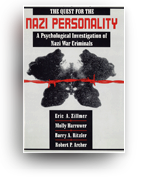 |

Open to Interpretation…The Art and Science of Inkblots
Ashland, OH: Hogrefe, 2009
[more]
............................................
Principles of Neuropsychology
Belmont, CA: Wadsworth, 2008
[more]
............................................
Military Psychology: Clinical and Operational Applications
New York, NY: Guilford, 2006
[more]
............................................
The Quest for
the Nazi Personality
Hillsdale, NJ: Lawrence Erlbaum Associates, 1995
............................................
Neuropsychological Assessment and Intervention
Springfield, IL: Charles Thomas, 1992
[more]
|
 |
|
 |
 |
 |
THE QUEST FOR THE NAZI PERSONALITY:
A Psychological Investigation of Nazi War Criminals

Eric A. Zillmer, Molly Harrower, Barry A. Ritzler, & Robert P. Archer
Hillsdale, NJ: Lawrence Erlbaum Associates, 1995
|

In 1945, the Rorschach test was administered to the Nazi prisoners awaiting trial in Nuremberg¹. Were the results used in the trials?
No. It wasn't a forensic evaluation, although the prosecutors did ask about Rudolf Hess. Hess was the one who had traveled to Great Britain on his own terms, crashed his plane, and had been brought back to Nuremberg for trial. They asked the prison psychiatrist, Major Douglas Kelley, and the prison psychologist, Lieutenant Gustave Gilbert, if Hess was competent to stand trial because he was acting so unusually. They declared that he was. Kelley and Gilbert administered the Rorschach tests on the side, believe it or not, because they wanted to later publish works on the Nazi personality. The tests were never ordered in the court and they were never used. That's why they never became part of the official court recordings.
A personal vendetta between Kelley and Gilbert kept these records from being published. Gilbert spoke fluent German but really didn't know the Rorschach test, so he tried to get the raw data at Nuremberg and worry about interpreting them later. Kelley knew the Rorschach very well but didn't know any German and needed a translator. He wrestled with depression after the trials and never really had the energy to interpret them. In 1958 he committed suicide. Gilbert, on the other hand, was very ambitious and recruited other psychologists to interpret the tests for him. That's how I got the records for our book, because he sent them out to ten other psychologists and they ended up in some of their archives. The Eichmann protocol, collected by Kulcsar before the 1962 trial in Jerusalem, however, has been analyzed repeatedly by several psychologists.
Next Question...
¹Twenty-four Nazis were chosen to stand trial at Nuremberg. Of these, Martin Bormann died before being brought to trial, Ley committed suicide at Nuremberg, and Krupp was considered unfit to stand trial. The 21 remaining defendants who did complete the trial included Herman Göring, Rudolf Hess, Alfred Rosenberg, and Albert Speer.
|
|